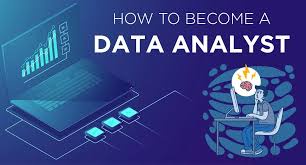In today's digital age, the role of a digital analyst is becoming increasingly important for organizations looking to leverage data-driven insights for strategic decision-making and business growth. If you're interested in pursuing a career as a digital analyst, this comprehensive guide will provide you with step-by-step instructions on how to embark on this rewarding journey.
1. Understand the Role of a Digital Analyst
First and foremost, it's crucial to have a clear understanding of what a digital analyst does. A digital analyst is responsible for analyzing digital data to extract meaningful insights that can inform marketing strategies, user experience improvements, and overall business decisions. They work with various tools and technologies to collect, process, and interpret data related to website traffic, user behavior, and campaign performance.
2. Develop Analytical Skills
One of the key requirements for becoming a successful digital analyst is to have strong analytical skills. Focus on enhancing your ability to interpret data, identify trends, and draw actionable conclusions. Learn statistical analysis techniques and familiarize yourself with data visualization tools like Google Analytics, Tableau, or Power BI.
3. Gain Proficiency in Digital Marketing Concepts
A solid understanding of digital marketing concepts is essential for a digital analyst. Learn about search engine optimization (SEO), pay-per-click (PPC) advertising, social media marketing, email marketing, and content marketing. Understanding these concepts will help you contextualize the data you analyze and provide valuable insights to marketing teams.
4. Acquire Technical Skills
Digital analysts work with a variety of tools and technologies to collect and analyze data. Familiarize yourself with web analytics platforms like Google Analytics or Adobe Analytics. Learn basic scripting languages such as JavaScript or Python, which can be useful for data extraction and manipulation tasks.
5. Pursue Relevant Education and Training
While a formal degree in marketing, statistics, computer science, or a related field can be beneficial, there are also specialized data analyst course and certifications specifically focused on digital analytics. Consider enrolling in online data analytics course, workshops, or certification programs offered by platforms like Google Analytics Academy or HubSpot Academy.
6. Gain Hands-on Experience
Practical experience is invaluable for aspiring digital analysts. Look for internships, entry-level positions, or freelance opportunities that allow you to apply your skills in a real-world setting. Work on projects that involve data analysis, campaign tracking, and performance reporting to build your portfolio.
7. Develop Communication Skills
Effective communication is key for digital analysts to convey complex data insights to non-technical stakeholders. Practice translating data findings into actionable recommendations through clear and compelling presentations or reports. Develop interpersonal skills to collaborate effectively with cross-functional teams.
8. Stay Updated with Industry Trends
The field of digital analytics is constantly evolving with advancements in technology and changes in consumer behavior. Stay updated with industry trends, new tools, and best practices by following industry blogs, attending webinars, and participating in professional networking events.
9. Specialize in a Niche Area
Consider specializing in a specific area of digital analytics based on your interests and career goals. This could include web analytics, conversion rate optimization (CRO), marketing attribution, or data visualization. Specialization can enhance your expertise and make you a valuable asset in the job market.
10. Build a Professional Network
Networking is crucial for career growth in digital analytics. Connect with professionals in the industry through LinkedIn, industry events, and professional associations like the Digital Analytics Association (DAA). Seek mentorship from experienced digital analysts who can provide guidance and insights into career advancement.
11. Continuous Learning and Adaptation
Lastly, embrace a mindset of continuous learning and adaptation. The digital landscape is dynamic, and new technologies emerge rapidly. Stay curious, experiment with new tools and techniques, and be open to acquiring new skills that will enhance your effectiveness as a digital analyst.
Conclusion
Becoming a digital analyst requires a combination of technical skills, analytical abilities, digital marketing knowledge, and effective communication. By following the steps outlined in this guide, you can embark on a fulfilling career path in digital analytics. Keep honing your skills, gaining practical experience, and staying updated with industry trends to thrive in this dynamic and rewarding field.
To accelerate your journey towards becoming a digital analyst, consider enrolling in a reputable online data analyst course. These courses offer structured learning, hands-on experience with data analysis tools, and industry-recognized certifications that can enhance your credibility and marketability. Embrace the opportunities for growth and specialization within digital analytics, and leverage your skills to make data-driven decisions that drive business success. Embracing a lifelong learning mindset will ensure you stay competitive and adaptable in the ever-evolving digital landscape.


No comments yet